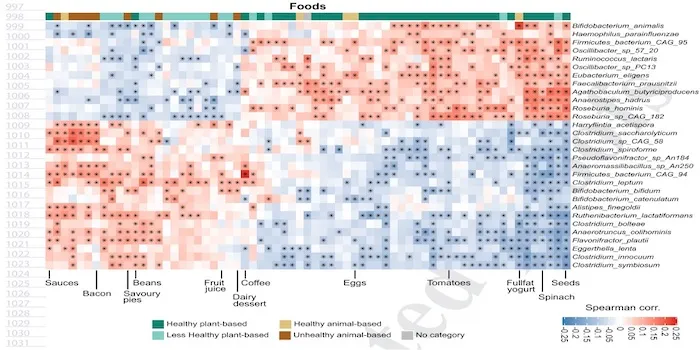An ongoing international microbiome study has unveiled the individual gut microbes associated with both lower and higher risk for ill health and obesity, and the foods that feed them, with some microbes so novel that they have not yet been named.
The study team say these findings can be used to provide personalized dietary advice for better health, based on gut microbiome testing.
They analyzed detailed data on the composition of participants’’ gut microbiome, their dietary habits and cardiometabolic blood biomarkers. They gathered microbiome sequence data, detailed long-term dietary information, and results of hundreds of cardiometabolic blood markers from over 1100 participants in the UK. The results show that the microbes have a greater association to biomarkers of metabolic disease then other factors, such as genetics.
Good and bad bugs
The found clear segregation of gut microbes into the distinct clusters associated with either more healthy plant-based foods (such as spinach, seeds, tomatoes, broccoli) or less healthy plant based (juices, sweetened beverages, refined grains) and animal-based food.
The data were linked to healthy plant-based food mostly included butyrate producers, such as Roseburia hominis, Agathobaculum butyriciproducens, Faecalibacterium prasunitzii and Anaerostipes hadrus, as well as uncultivated species, predicted to have this metabolic capability (Roseburia bacterium CAG:182 and Firmicutes bacterium CAG:95). Also, correlations were found between less healthy plant-based and animal-based foods with Clostridium species (Clostridium innocum, Clostridium symbiosum, Clostridium spiroforme, Clostridim leptum Clostridium saccharolyticum).
The segregation of species according to animal based healthy foods (eggs, white and oily fish) or animal-based less healthy foods (meat pies, bacon, dairy desserts) was also distinct and overlapping with data for healthy and less healthy plant foods.
The diversity and quality of a healthy diet was particularly predictable by the microbiome, highlighting the importance of looking beyond nutrients and single foods in diet microbiome research. Dr. Sarah Berry, co-author of the paper said: “As a nutritional scientist, finding novel gut microbes that are linked to specific foods, as well as metabolic health, is exciting. Given the highly personalized composition of each individual’s’ microbiome, our research suggest that we may be able to modify our gut microbiome to optimize out health by choosing the best foods for our unique biology.
Link with Obesity
The researchers also found that the gut microbiome is a better predictor of postprandial triglycerides and insulin concentrations than of glucose levels. They report reveal robust microbiome-based biomarkers of obesity, as well as markers for cardiovascular disease an impaired glucose tolerance, which re risk factors for COVID. It states: Our machine learning approach found that visceral fat to be more strongly linked to gut microbial composition than BMI33, a finding again validated in US participants. Some obesity-associated taxa were also indicators of poor dietary patterns after controlling for BMI (for example, Clostridium CAG:58, Flavonifractor plautii), whereas food and patterns of intake, illustrating that diet and obesity microbiome signatures overlap but are not identical.”
Personalized nutrition
Health science start-up ZOE has already translated these cutting-edge discoveries into an at-home microbiome test, current available in the US and to be made available in the UK by the end of the year. Biocoherence Nederland offers this type of microbiome analysis as a standard service for Health Professionals analyzing the clients’ microbiome as Regulation System in health and disease.
Source: Nature Medicine, Microbiome connections with host metabolism and habitual diet 1098 deeply phenotyped individuals”.






